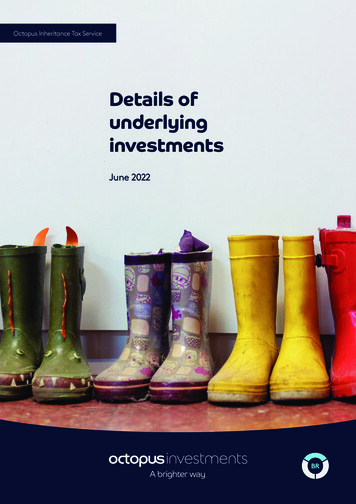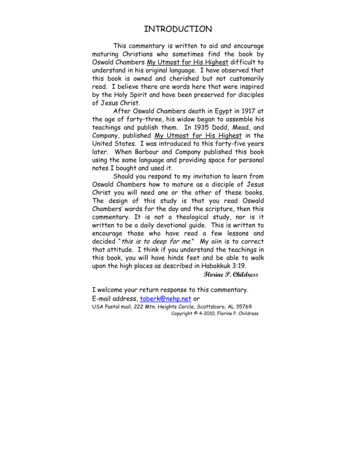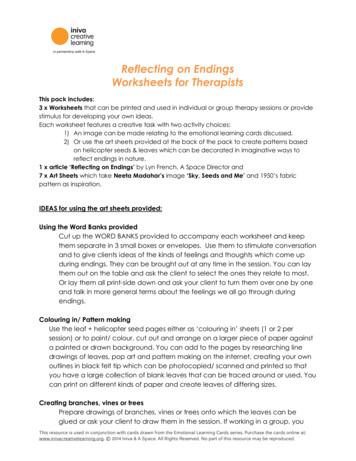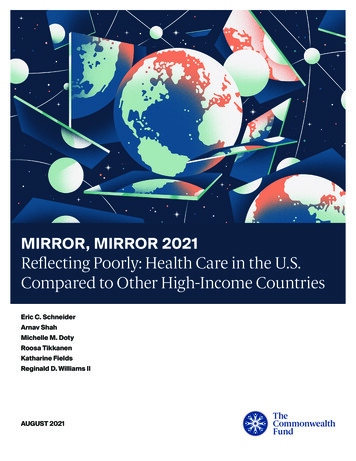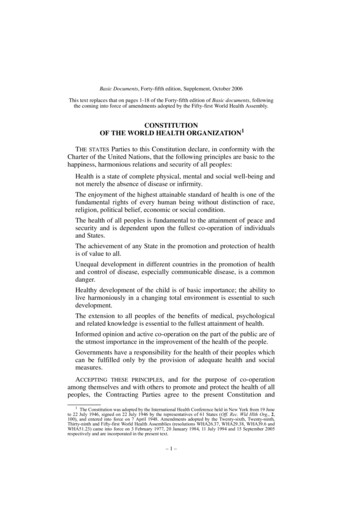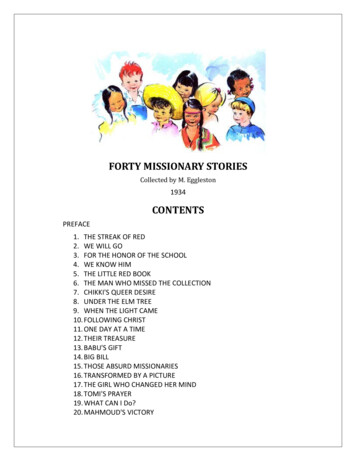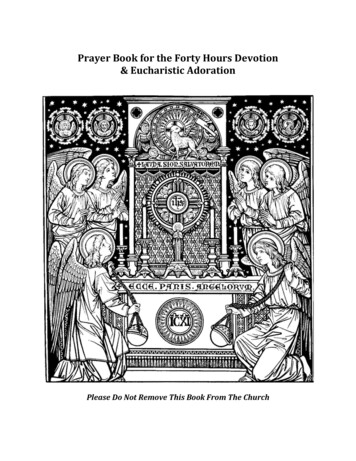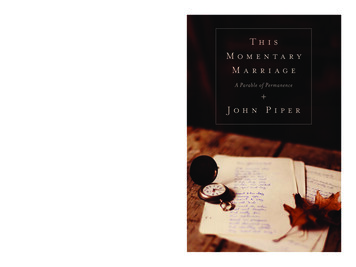
Transcription
“ This is not a ‘how to’ book on marriage. Instead, this is a ‘why to’ book.And that’s what this culture desperately needs.”Dennis Rainey, President, FamilyLife“ This book sets marriage within the matrix of the Bible’s fundamentalthemes. If its God-centered and gospel-centered theology is genuinelyabsorbed, many of the ‘how to’ questions will be answered.”D. A. Carson, Research Professor of New Testament, Trinity Evangelical Divinity School“ A treasure in an era when the common perspective on marriage hasbeen shaped more by sitcoms and self-help books than by Scripture.Piper lifts our hearts and minds to God’s vision for marriage.”Nancy Leigh DeMoss, radio host, Revive Our Hearts“ Heed the surprising call of this book and you’ll appreciate the sacredprivilege of marriage that our culture fails to see.”Larry Crabb, biblical counselor; author,66 Love Letters“ This book applies the vision of grace to our experiences in marriage,singleness, parenthood, and the most universal reality—sin.”Ray Ortlund, Pastor, Immanuel Church, Nashville, TennesseeTh is Mom en ta ry M a r r i ageReflecting on forty years of marriage, John Piper rivetsour attention on its Christ-exalting, covenant-keepingessence—the rich soil for genuine growth.“ An instant classic. It is biblical and devotional, the fruit of seasonedtheological reflection and four decades of ‘momentary’ marriage.”JOHN PIPER is pastor for preaching and vision at Bethlehem Baptist Church in Minneapolis, and a few of his many books include VelvetSteel, Sex and the Supremacy of Christ, What Jesus Demands from theWorld, and Don’t Waste Your Life.U.S. 14.99Christian Living / MarriagePiperAndreas Köstenberger, author, God, Marriage, & FamilyTh isMomentaryMarriageA Parable of PermanenceJohn Piper
This Momentary MarriageCopyright 2009 by Desiring God FoundationPublished by Crossway1300 Crescent StreetWheaton, Illinois 60187All rights reserved. No part of this publication may be reproduced, stored in aretrieval system or transmitted in any form by any means, electronic, mechanical,photocopy, recording or otherwise, without the prior permission of the publisher,except as provided for by USA copyright law.Cover design and image: Erik MaldreFirst printing 2009Reprinted with new cover 2012Printed in the United States of AmericaScripture quotations are from the ESV Bible (The Holy Bible: English StandardVersion ), copyright 2001 by Crossway. Used by permission. All rights reserved.All emphases in Scripture quotations have been added by the author.Trade Paperback ISBN: 978-1-4335-3111-8PDF ISBN: 978-1-4335-0713-7Mobipocket ISBN: 978-1-4335-0714-4ePub ISBN: 978-1-4335-2059-4Library of Congress Cataloging-in-Publication DataPiper, John, 1946–This momentary marriage : a parable of permanence / John Piper.p. cm.Includes bibliographical references and indexes.ISBN 978-1-4335-0712-01. Marriage—Religious aspects—Christianity. I. Crossway is a publishing ministry of Good News 21
ContentsForeword: Pendulums and Pictures by Noël PiperIntroduction: Marriage and Martyrdom9131 Staying Married Is Not Mainly about Staying in Love192 Naked and Not Ashamed293 God’s Showcase of Covenant-Keeping Grace414 Forgiving and Forbearing515 Pursuing Conformity to Christ in the Covenant636 Lionhearted and Lamblike—The Christian Husbandas Head : Foundations of Headship737 Lionhearted and Lamblike—The Christian Husbandas Head: What Does It Mean to Lead?838 The Beautiful Faith of Fearless Submission959 Single in Christ: A Name Better Than Sons andDaughters10510 Singleness, Marriage, and the Christian Virtueof Hospitality11711 Faith and Sex in Marriage12712 Marriage Is Meant for Making Children . . . Disciplesof Jesus: How Absolute Is the Duty to Procreate?13713 Marriage Is Meant for Making Children . . . Disciples147of Jesus: The Conquest of Anger in Father and Child14 What God Has Joined Together, Let Not Man157Separate: The Gospel and the Radical New Obedience
15 What God Has Joined Together, Let Not ManSeparate: The Gospel and the Divorced167Conclusion: This Momentary Marriage177A Few Words of Thanks179Scripture Index181Person Index185Subject Index187A Note on Resources: Desiring God192
Introduction:Marriage and MartyrdomDietrich Bonhoeffer was engaged to be married to Maria vonWedemeyer when he was hanged at dawn on April 9, 1945, at theage of thirty-nine. As a young pastor in Germany, he had been opposedto Nazism and was finally arrested on April 5, 1943, for his involvementin a conspiracy to assassinate Adolf Hitler.So he never married. He skipped the shadow on the way to theReality. Some are called to one kind of display of the worth of Christ,some to another. Martyrdom, not marriage, was his calling.Being married in the moment of death is both a sweet and bitterprovidence. Sweet because at the precipice of eternity the air is crystalclear, and you see more plainly than ever the precious things that reallymatter about your imperfect lover. But being married at death is alsobitter, because the suffering is doubled as one watches the other die, oreven quadrupled if both are dying. And more if there is a child.One Flesh Even in DeathThat was the case with John and Betty Stam. They were missionarieswith China Inland Mission. Having met each other at Moody BibleInstitute, they sailed for China separately—she in 1931, he a year later.They were married by Reuben A. Torrey on October 25, 1933, inTsinan. John was twenty-six; Betty was twenty-seven.The region was already dangerous because of the civil war betweenthe Chinese Nationalist Party and the Chinese Communist Party. OnSeptember 11, 1934, Helen Priscilla was born. Three months later, herparents were beheaded by the Communists on a hill outside Miaosheo,while tiny Helen lay hidden where her mother left her with ten dollarsin her blanket.
14 IntroductionGeraldine Taylor, the daughter-in-law of Hudson Taylor (the founderof the China Inland Mission), published the story of the Stams’ martyrdom two years after their death. Every time I read it, the compoundingof the preciousness and the pain by the marriage and the baby make meweep.Never was that little one more precious than when they looked theirlast on her baby sweetness, as they were roughly summoned thenext morning and led out to die. . . . Painfully bound with ropes,their hands behind them, stripped of their outer garments, and Johnbarefooted (he had given Betty his socks to wear), they passed downthe street where he was known to many, while the Reds shouted theirridicule and called the people to come and see the execution.Like their Master, they were led up a little hill outside the town.There, in a clump of pine trees, the Communists harangued theunwilling onlookers, too terror-stricken to utter protest—But no,one broke the ranks! The doctor of the place and a Christian, heexpressed the feelings of many when he fell on his knees and pleadedfor the life of his friends. Angrily repulsed by the Reds, he still persisted, until he was dragged away as a prisoner, to suffer death whenit appeared that he too was a follower of Christ.John had turned to the leader of the band, asking mercy for thisman. When he was sharply ordered to kneel—and the look of joyon his face, afterwards, told of the unseen Presence with them as hisspirit was released—Betty was seen to quiver, but only for a moment.Bound as she was, she fell on her knees beside him. A quick command, the flash of a sword which mercifully she did not see—andthey were reunited.1Nothing Is LostYes, they were reunited, but not as husband and wife. For Jesus said,“When they rise from the dead, they neither marry nor are given inmarriage, but are like angels in heaven” (Mark 12:25). There is nohuman marriage after death. The shadow of covenant-keeping between husband and wife gives way to the reality of covenant-keeping1Mrs. Howard Taylor, The Triumph of John and Betty Stam (Philadelphia: China Inland Mission, 1936),107–108. The child had been hidden and was found by Christians and saved.
Introduction15between Christ and his glorified Church. Nothing is lost. The music ofevery pleasure is transposed into an infinitely higher key.Dietrich Bonhoeffer and John and Betty Stam today are closerto each other in love than John and Betty Stam were, or Dietrich andMaria would have been, in marriage. They “shine like the sun in thekingdom of their Father” (Matt. 13:43). Their magnificent perfectionpoints to the glory of Christ. And in the age to come, their bodies willbe restored, and all creation will join with the children of God in everlasting joy (Rom. 8:21).As the Crown Makes the King,Marriage Makes OneThe month after Bonhoeffer’s imprisonment, and two years before hisdeath, Bonhoeffer wrote from the military section of the prison at Tegel,Berlin, “A Wedding Sermon from a Prison Cell.” His text was Ephesians1:12: “. . . so that we who were the first to hope in Christ might be tothe praise of his glory.”Marriage is more than your love for each other. . . . In your love yousee only the heaven of your own happiness, but in marriage you areplaced at a post of responsibility towards the world and mankind.Your love is your own private possession, but marriage is more thansomething personal—it is a status, and office. Just as it is the crown,and not merely the will to rule, that makes the king, so it is marriage,and not merely your love for each other, that joins you together inthe sight of God and man.2The aim of this book is to enlarge your vision of what marriageis. As Bonhoeffer says, it is more than your love for each other. Vastlymore. Its meaning is infinitely great. I say that with care. The meaningof marriage is the display of the covenant-keeping love between Christand his people.This covenant-keeping love reached its climax in the death of2DietrichBonhoeffer, Letters and Papers from Prison, ed. Eberhard Bethge (New York: Macmillan,1967), 27. All the quotes from Bonhoeffer on the facing pages of each chapter of this book were takenfrom Letters and Papers from Prison; Dietrich Bonhoeffer, Life Together (London: SCM Press, 1954);Dietrich Bonhoeffer, The Cost of Discipleship (New York: Macmillan, 1967).
16 IntroductionChrist for his church, his bride. That death was the ultimate expression of grace, which is the ultimate expression of God’s glory, whichis of infinite value. Therefore, when Paul says that our great and finaldestiny is “the praise of [God’s] glorious grace” (Eph. 1:6), he elevatesmarriage beyond measure, for here, uniquely, God displays the apex ofthe glory of his grace: “Christ loved the church and gave himself up forher” (Eph. 5:25).A Strange Way to Start a Bookon MarriageThinking about martyrdom may seem like a strange way to begin abook on marriage. If we lived in a different world, and had a differentBible, I might think it strange. But here is what I read.Let those who have wives live as though they had none.(1 Cor. 7:29)“If anyone comes to me and does not hate his own father and motherand wife and children and brothers and sisters, yes, and even his ownlife, he cannot be my disciple.” (Luke 14:26)“Truly, I say to you, there is no one who has left house or wife orbrothers or parents or children, for the sake of the kingdom of God,who will not receive many times more in this time, and in the age tocome eternal life.” (Luke 18:29–30)I take those verses to mean: Marriage is a good gift of God, but theworld is fallen, and sin abounds, and obedience is costly, and suffering isto be expected, and “a person’s enemies will be those of his own household” (Matt. 10:36). High romance and passionate sexual intimacy andprecious children may come. But hold them loosely—as though youwere not holding them. This is what Bonhoeffer represents. To keep hislife and meaning before us throughout this book, I will let him speakbriefly on the facing pages at the beginning of each chapter.Romance, sex, and childbearing are temporary gifts of God. Theyare not part of the next life. And they are not guaranteed even for this
Introduction17life. They are one possible path along the narrow way to Paradise.Marriage passes through breathtaking heights and through swampswith choking vapors. It makes many things sweeter, and with it comebitter providences.We Made ItMarriage is a momentary gift. I have only scratched the surface of itswonders and its wounds. I hope that you will go farther and deeperand higher. As this book is published, Noël and I are passing our fortieth anniversary of marriage. She is God’s gift to me—far better than Ideserve. We speak often of the wonder of being married till one of usdies. It has not been trouble-free. So we imagine ourselves in our seventies or eighties—when divorce is not only sin, but socially silly—sittingacross from each other, perhaps at Old Country Buffet, and smiling ateach other’s wrinkled faces, and saying with the deepest gratitude forGod’s grace: “We made it.”To those who are just beginning, I simply join Dietrich Bonhoefferin saying,“Welcome one another . . . for the glory of God.” That is God’s wordfor your marriage. Thank him for it; thank him for leading you thusfar; ask him to establish your marriage, to confirm it, sanctify it,and preserve it. So your marriage will be “for the praise of his glory.”Amen.33Lettersand Papers from Prison, 32.
4Forgiving and ForbearingPut on then, as God’s chosen ones, holy and beloved, compassionate hearts, kindness,humility, meekness, and patience, bearing with one another and, if one has a complaintagainst another, forgiving each other; as the Lord has forgiven you, so you also mustforgive. And above all these put on love, which binds everything together in perfect harmony. And let the peace of Christ rule in your hearts, to which indeed you were calledin one body. And be thankful. Let the word of Christ dwell in you richly, teaching andadmonishing one another in all wisdom, singing psalms and hymns and spiritual songs,with thankfulness in your hearts to God. And whatever you do, in word or deed, doeverything in the name of the Lord Jesus, giving thanks to God the Father through him.Wives, submit to your husbands, as is fitting in the Lord. Husbands, love your wives, anddo not be harsh with them.C OL O S S I A N S 3:12 –19Recall that there are at least three reasons my wife was right whenshe said, “You cannot say too often that marriage is a model ofChrist and the church” (cf. Eph. 5:31–32). One was that saying thisabout marriage lifts it out of the sitcom sewer and elevates it into thebright, clear sky of God’s glory where it is meant to be. Another was thatsaying this about marriage places it firmly on the basis of grace. By graceChrist took the church to be his bride in the first place, and by grace hesustains her. If marriage models that, it will be full of grace. This willbe its ground and its glory. The third reason that we should stress oftenthat marriage is a model of Christ and the church is that it profoundly
52 This Momentary Marriageshapes the way we understand headship and submission. We will dealwith this in Chapters 6–8.Human Marriage Will VanishThe first two chapters of this book were meant to support that firstreason. I tried to show that marriage is the doing of God and the displayof God—especially his grace. That is its glory—marriage is from himand through him and to him. This is the bright, clear sky of God’s glorywhere marriage was meant to be.Another way to see this is to recall that human marriage is temporary. To be sure, it points to something eternal, namely, Christ and thechurch. But when this age is over, it will vanish into the superior realityto which it points.Jesus said in Matthew 22:30, “In the resurrection they neithermarry nor are given in marriage, but are like angels in heaven.” Thisis why my father, Bill Piper, will not be a bigamist in the resurrection.Both my mother and my stepmother have died. My father had a thirtysix-year marriage with my mother and, after her death, a twenty-fiveyear marriage with my stepmother. But in the resurrection, the shadowgives way to the reality. My father will not be married in heaven, eitherto my mother or to my stepmother. Marriage is a pointer toward theglory of Christ and the church. But in the resurrection the pointervanishes into the perfection of that glory.Bending Grace from Vertical to HorizontalThen the point in Chapter 3 was that marriage is based on grace—thevertical experience of grace from Christ through his death on the cross,and then that very grace bent out horizontally from husband to wifeand from wife to husband. Colossians 2:14 tells us how God provided abasis for the forgiveness of our sins: “. . . by canceling the record of debtthat stood against us with its legal demands. This he set aside, nailingit to the cross.” The record of debt that mounts up against us becauseof our sin God set aside by nailing it to the cross—and the point, ofcourse, is not that nails and wood take away sin, but that the piercedhands and feet of the Son of God take away sin (see Isa. 53:5–6).
Forgiving and Forbearing53Having shown us the basis of God’s forgiveness in the cross, Paulthen says in Colossians 3:13, “As the Lord has forgiven you, so you alsomust forgive.” In other words, take the forgiveness and justificationthat you have received vertically through the death of Christ and bendit out horizontally to others. Specifically, husbands to wives and wivesto husbands.Why the Focus on Forgiveness?I asked the question near the end of Chapter 3: Why this emphasis onforgiving and forbearing rather than, say, on romance and enjoying eachother? I gave three answers: 1) because there is going to be conflict basedon sin, we need to forgive sin and forbear strangeness, and sometimesyou won’t even agree on which is which; 2) because the hard, ruggedwork of forgiving and forbearing is what makes it possible for affectionsto flourish when they seem to have died; and 3) because God gets glorywhen two very different and very imperfect people forge a life of faithfulness in the furnace of affliction by relying on Christ.To Spare You SeparationSo in this chapter, I want to deal more thoroughly with forbearingand forgiving. Let me say at the outset that I am aware—painfullyaware—that there are sins that spouses commit against each other thatcan push forbearance and forgiveness across the line into the assisting ofsin and may even warrant a redemptive separation—I choose the wordscarefully: a redemptive separation. I am thinking of things like assault,adultery, child abuse, drunken rage, addictive gambling or theft or lyingthat brings the family to ruin.My aim in this chapter is not to talk about these—that will comelater when we take up the topic of separation and divorce and remarriage. Here I am trying to describe a biblical pattern of forbearance andforgiveness that can keep you from reaching the point of separation,and maybe even bring some of you back from the brink—perhaps evenrestore some marriages that the world calls “divorced.” And I pray thiswill also sow seeds in single people who may one day be married, so thatyou will build your marriage on this rock of grace.
54 This Momentary MarriageThe Foundation: The Person and Workof ChristWhen Paul gets to Colossians 3:12, he has laid a massive foundationin the person and work of Christ on the cross. This is the foundationof marriage and all of life. The main battles in life and in marriage arebattles to believe this person and this work. I mean really believe it—trust it, embrace it, cherish it, treasure it, bank on it, breathe it, shapeyour life by it. So when Paul gets to Colossians 3:12, he exhorts us withwords that are explosive with emotion-awakening reality built on Christand his saving work.First there are three descriptions of you, the believer, that Pauluses to help you receive his exhortation. “Put on then, as God’s chosenones, holy and beloved . . .” He is about to tell us what kind of heart andattitude we should have—putting it on like a garment. But first he callsus chosen, holy, loved.ChosenWe are God’s elect. Before the foundation of the world, God chose usin Christ. You can hear how precious this is to Paul with his words fromRomans 8:33: “Who shall bring any charge against God’s elect?” Theanswer is that absolutely nobody can make a charge stick against God’select. Paul wants us to feel the wonder of being elect as being invinciblyloved. If you resist the truth of election, you resist being loved in thefullness and the sweetness of God’s love.HolyThen he calls us holy—that is, set apart for God. He chose us for apurpose—to be his holy people. To come out of the world and notbe common or unclean anymore. Ephesians 1:4: “He chose us in himbefore the foundation of the world, that we should be holy.” First Peter2:9: “You are a chosen race . . . a holy nation.” This is first a positionand a destiny before it is a pattern of behavior. That is why he is tellingus the kind of behavior to “put on.” He knows we are not there yet,practically. He is calling us to become holy in life because we are holy inChrist. Dress to fit who you are. Wear holiness.
Forgiving and Forbearing55LovedThen he calls us loved. “God’s chosen ones, holy and beloved.” If you area believer in Christ, God, the maker of the universe, chose you, set youapart for himself, and loves you. He is for you and not against you.“God shows his love for us in that while we were still sinners, Christdied for us” (Rom. 5:8).See and Savor These Three WondersThis is the beginning of how husbands and wives forbear and forgive.They are blown away by being chosen, set apart, and loved by God.Husbands, devote yourselves to seeing and savoring this. Wives, dothe same. Get your life from this. Get your joy from this. Get yourhope from this—that you are chosen, set apart, and loved by God. Pleadwith the Lord that this would be the heartbeat of your life and yourmarriage.On this basis now—on the basis of this profound, new, Godcentered identity as chosen, holy, and loved—we are told what to “puton.” That is, we are told what kind of attitude and behavior fits with,and flows from, being chosen, set apart, and loved by God throughChrist.Paul shows us that there are three inward conditions that lead inturn to three outward demeanors. “Put on then, as God’s chosen ones,holy and beloved, compassionate hearts, kindness, humility, meekness,and patience, bearing with one another and, if one has a complaintagainst another, forgiving each other.” We will break it down into pairs:compassionate hearts and kindness, humility and meekness, patienceand forbearance (and forgiveness).From Bowels of Mercy to Kindness“Put on then, as God’s chosen ones, holy and beloved, compassionate hearts, kindness” (Col. 3:12). “Compassionate hearts” is a moderntranslation of the phrase “bowels of mercy.” “Bowels of mercy” is theinward condition, and “kindness” is the outward demeanor. Be merciful in your inmost being, and then out of that good ground grows thefruit of kindness.
56 This Momentary MarriageSo husbands, sink your roots by faith into Christ through the gospel until you become a more merciful person. Wives, sink your roots byfaith into Christ through the gospel until you become a more mercifulperson. And then treat each other out of this tender mercy with kindness. The battle is with our own unmerciful inner person. Fight thatbattle by faith, through the gospel, in prayer. Be stunned and brokenand built up and made glad and merciful because you are chosen, holy,loved.From Humility to MeeknessThe next pair is “humility, meekness.” Verse 12: “Put on then, as God’schosen ones, holy and beloved, compassionate hearts, kindness, humility, meekness . . .” Literally, “lowliness, meekness.” Again “lowliness” isthe inward condition, and “meekness” is the outward demeanor. Peoplewhose hearts are lowly, instead of proud, will act more meekly towardothers. The meek count others above themselves and serve them. Thathappens when the heart is lowly, or humble.So, husbands, sink your roots by faith into Christ through thegospel until you become more lowly and humble. Wives, sink yourroots by faith into Christ through the gospel until you become morelowly and humble. The gospel of Christ’s painful death on our behalfhas a way of breaking our pride and our sense of rightful demandsand our frustration at not getting our way. It works lowliness intoour souls. Then we treat each other with meekness flowing out ofthat lowliness. The battle is with our own proud, self-centered innerperson. Fight that battle by faith, through the gospel, in prayer. Bestunned and broken and built up and made glad and humble becauseyou are chosen, holy, loved.From Long-Suffering to Forbearance and ForgivenessThe next pair is not exactly a pair. It’s an inner condition followed byforbearance and forgiveness. But forbearance and forgiveness are one.Neither can exist biblically without the other. Verse 12: “Put on then, asGod’s chosen ones, holy and beloved, compassionate hearts, kindness,humility, meekness, and patience, bearing with one another and, if one
Forgiving and Forbearing57has a complaint against another, forgiving each other.” So I am treating“patience” as the inner condition and forbearance/forgiveness as theoutward demeanor or behavior.The literal translation of patience is “long-suffering.” That is,become the kind of person who does not have a short fuse but a longone. A very long one. Become a patient person, slow to anger, quickto listen, slow to speak (Jas. 1:19). These three inner conditions I havementioned connect with each other and affect each other. “Bowels ofmercy” and “lowliness” lead to being “long-suffering.” If you are quickto anger, instead of being long-suffering, the root is probably lack ofmercy and lack of lowliness. In other words, being chosen, holy, andloved has not broken your heart and brought you down from selfcenteredness and pride.So, husbands, sink your roots by faith into Christ through thegospel until your heart is formed by these inner conditions of compassion and lowliness and patience. Fight for inner change—making youmore merciful and more lowly and, in that way, more long-suffering.In the same way, wives, sink your roots by faith into Christ throughthe gospel until you become more merciful and more lowly and morelong-suffering.Then treat each other with . . . what? This final pair is not exactly apair. First, there was the pair of compassionate or merciful hearts leading to a demeanor of kindness. Then there was the pair of humility orlowliness leading to a demeanor of meekness. But now there is patienceor long-suffering leading to what?Forbearing and Forgiving in Marriage“Put on then, as God’s chosen ones, holy and beloved . . . patience,bearing with one another and, if one has a complaint against another,forgiving each other” (Col. 3:12–13). The inner condition of patience isfollowed by two things, not one thing: first, “bearing with one another”and then, second, “if one has a complaint against another, forgivingeach other.” Forbearing and forgiving. What does this mean, and whatdoes it look like in marriage?First, a comment about the two words. Forbear or bear with: The
58 This Momentary Marriageword is literally endure—enduring each other. Jesus uses it in Luke 9:41:“O faithless and twisted generation, how long am I to bear with you?”Paul uses it again in 1 Corinthians 4:12: “When persecuted, we endure.”That’s the meaning here: Become long-suffering persons and endureeach other. Forbear. “Love bears all things, believes all things, hopes allthings, endures all things. Love never ends” (1 Cor. 13:7–8).The other word is forgive. There are at least two words for forgivein the New Testament. This one used here (charizomenoi) means “freelyor graciously give.” The idea is that when we forgive, we do not exact apayment. We treat people better than they deserve. So in this sense, youforgive when someone has wronged you, and therefore they are in debtto you, and sheer justice says you have the right to exact some sufferingfrom them in payment for the suffering they caused you. You not onlydon’t demand the payment, but you “freely give” good for evil. That isthe meaning of this word forgive (charizomai). Your ordinary dispositionis forgiving—you do not return evil for evil, but you bless (Matt. 5:44;Luke 6:27; 1 Cor. 4:12; 1 Thess. 5:15).“For Better or for Worse”Now what I find so helpful here is that Paul recognizes that both forgiving and forbearing are crucial for life together—whether in church ormarriage. Forgiveness says: I will not treat you badly because of yoursins against me or your annoying habits. And forbearance acknowledges(usually to itself ): Those sins against me and those annoying habitsreally bother me or hurt me! If there were nothing in the other personthat really bothered us or hurt us, there would be no need for saying“endure one another.”When you marry a person, you don’t know what they are goingto be like in thirty years. Our forefathers did not craft wedding vowswith their heads in the sand. Their eyes were wide-open to reality—“to have and to hold from this day forward, for better, for worse, forricher, for poorer, in sickness and in health, to love, honor, and cherish,’til death do us part, and thereto I plight thee my troth [I pledge youmy faithfulness].” You don’t know what this person will be like in thefuture. It could be better than you ever dreamed, or worse. Our hope
Forgiving and Forbearing59is based on this: We are chosen, holy, and loved. God is for us, andall things will work for the good of those who love him (Rom. 8:28;Ps. 23:6; 84:11).The Compost PileSo what about the compost pile I mentioned at the end of the last chapter? Picture your marriage as a grassy field. You enter it at the beginningfull of hope and joy. You look out into the futu
Marriage A Parable of Permanence John Piper Christian Living / Marriage U.S. 14.99 Reflecting on forty years of marriage, John Piper rivets our attention on its Christ-exalting, covenant-keeping essence—the rich soil for genuine growth. "This is not a 'how to' book on marriage. Instead, this is a 'why to' book.

